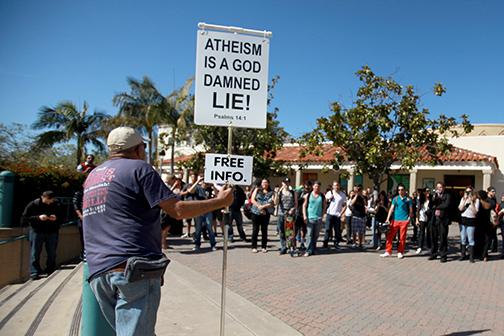One day not so long ago, an evangelist named Brother Jed graced our campus spreading a hateful hell-and-damnation message under the guise of Christianity.
The volatile demonstration drew a large crowd of Aztecs, though most were expressing indignation rather than support. I’m neither embarrassed nor proud to admit I was among this crowd, and was definitely “that girl,” yelling back and aggravating the scene.
[quote]To be clear, I wasn’t alone. The crowd loudly heckled the demonstrators, to no avail.[/quote] In the end, however, when campus police came to get things under control, it was the students they silenced, not the protesters.
As angry as that made me, it turns out they were right and we were wrong. According to the American Civil Liberties Union, police are bound “to protect the protester’s right to free speech and their physical safety, and to arrest or otherwise control those who seek to disrupt or attack the protester. Likewise, the police cannot arrest the protester, though their words are provoking a hostile audience reaction.”
A financial services sophomore Tom Bachar who quietly watched the scene unfold, astutely noted these seasoned activists know how to conduct a hate group and we as students don’t know how to respond.
Bachar is right. The audiences at these rallies often choose to verbally express their indignation toward the message because they feel the need to stand up for themselves. Unfortunately, by yelling back at the evangelists, we are bolstering their protection and hindering our own cause.
[quote]“If we want to change it, we have to do it within reason,” Bachar said. [/quote]
It’s impossible to form an argument for change without understanding the legal rights and restrictions of public demonstration. I decided to research these rights to find out exactly what Aztecs can and can’t do to stand up for themselves in the face of hateful demonstrations in the future.
What won’t work:
The most common argument for removal of offensive activists is to label their rhetoric as “fighting words,” a narrow category of speech that is not protected by the First Amendment. Fighting words are legally defined as “those which by their very utterance inflict injury or tend to incite an immediate breach of the peace.”
Any rhetoric short of inciting violence remains protected by law. And while a violent reaction may result in the removal of offensive activists, anyone involved would be vulnerable to arrest. Unless you want an assault charge on your record, you can rule out the option of a mounting a violent response just to prove a point.
Separation of church and state is also brought up as a reason that such activists should be banned from campus, because San Diego State is a state-funded university. However, as long as activists are not funded by or affiliated with the school, they don’t fall within this restriction.
What may be the most compelling argument is school administrations have the right to remove from campus any person, group or activity that disrupts the educational process. Unfortunately, this is subjective and largely up to the university. Based on the lack of action, I’d say the administration doesn’t consider this sort of demonstration to be overly disruptive.
Because SDSU is a government-funded entity, any action to terminate such a demonstration on campus could be seen as government censorship, and is therefore not the answer. The solution lies with students, and the way we choose to respond.
What will work:
Besides ignoring the demonstrations altogether, the only legally protected option we have is the right to counter-protest. According to the ACLU police “must ensure that the two opposing groups do not silence or harm each other,” but that both groups must be allowed to be in the same general area.
My suggestion is that we take this constitutionally protected right and run with it. Instead of arguing with narrow-minded demonstrators, we should mount a positive demonstration to combat their negative words.
Let your voice be heard!
I propose a massive sing-along.
Songs can unify many voices into one message, and that’s what we need to do here. So much popular music promotes the ideals of love, acceptance and diversity central to a positive college environment. Just to name a few, John Lennon’s “Imagine,” Lady Gaga’s “Born This Way” and Macklemore’s “Same Love,” lend themselves perfectly to such a cause.
The bottom line is fighting hate with hate just won’t work. Any anger we express only serves to fuel the vitriol of the hatemongers. By cutting off their supply of negative energy and replacing it with messages of peace and progress, we take attention away from them and maintain the positive atmosphere we so cherish about life at SDSU.
The next time we’re plagued with such bigotry and mean-spiritedness on our turf, let’s give this musical counter-protest a try. It may work, it may not, but at the end of the day singing some awesome tunes with your fellow Aztecs is a lot more fun than letting futile anger ruin your day. I’d say it’s a win either way.
Stock photo.







